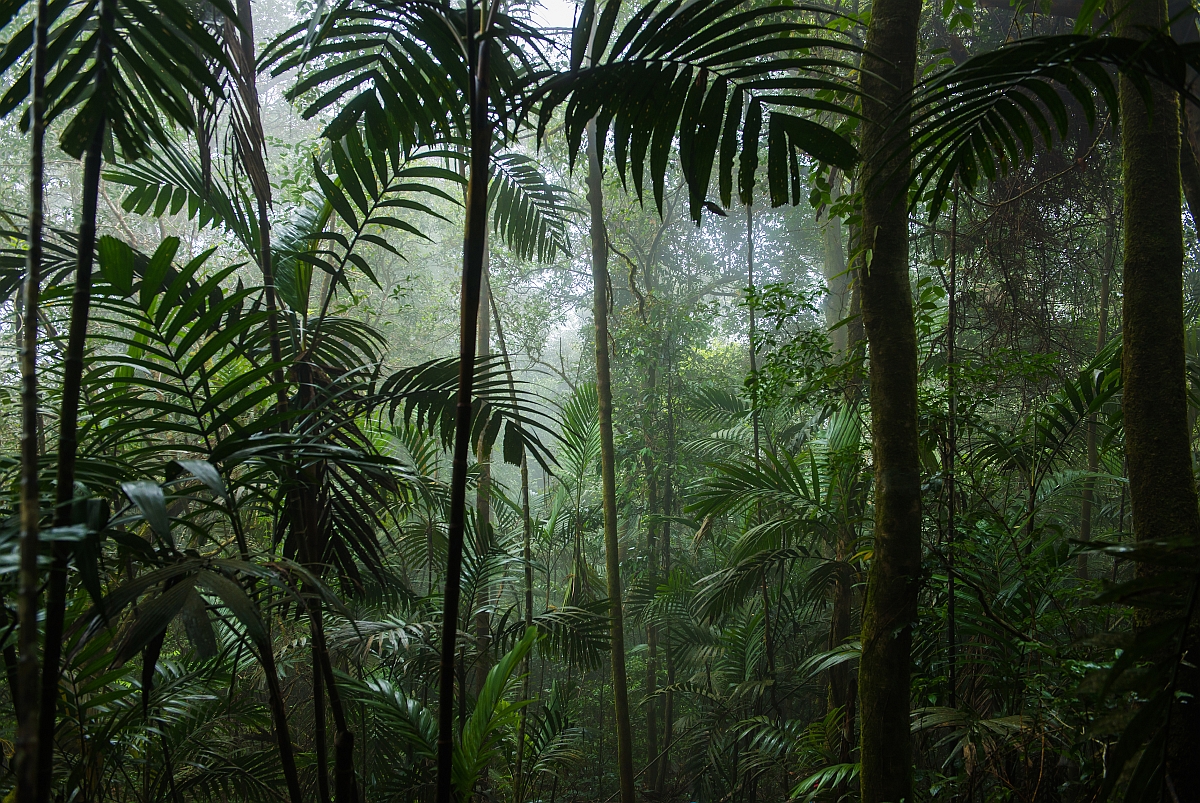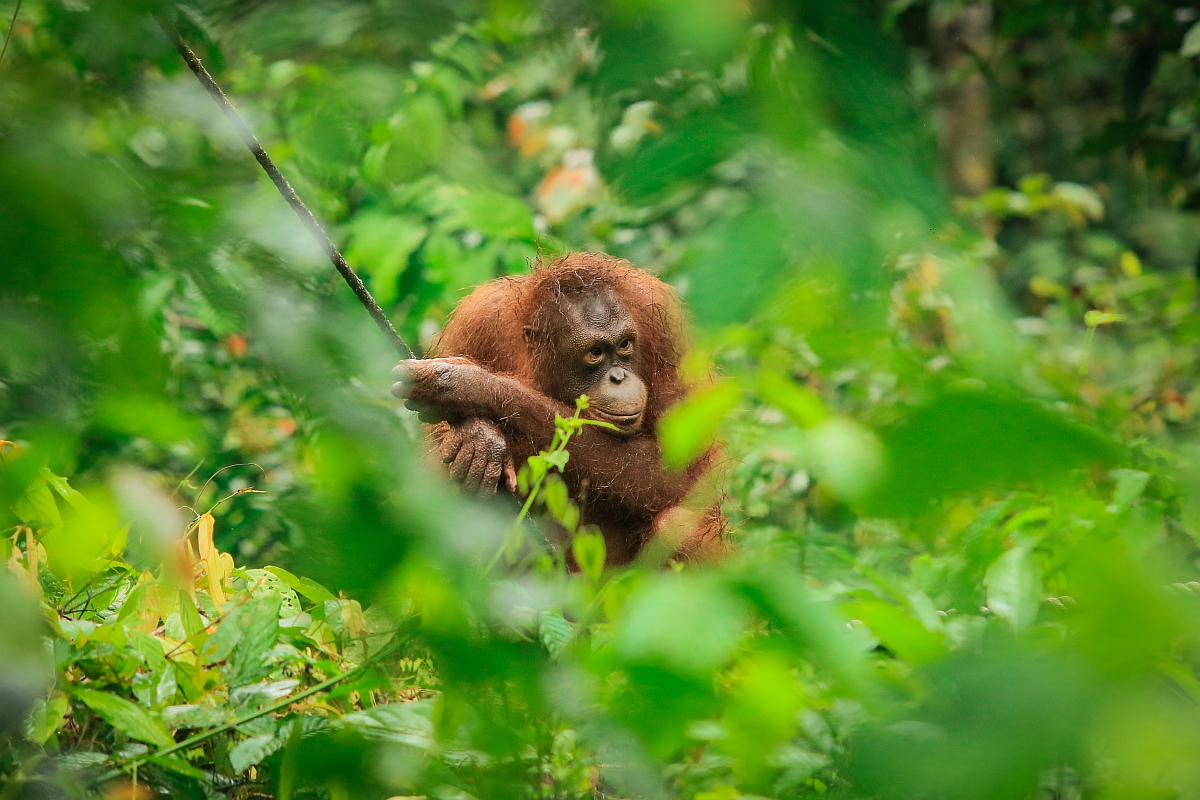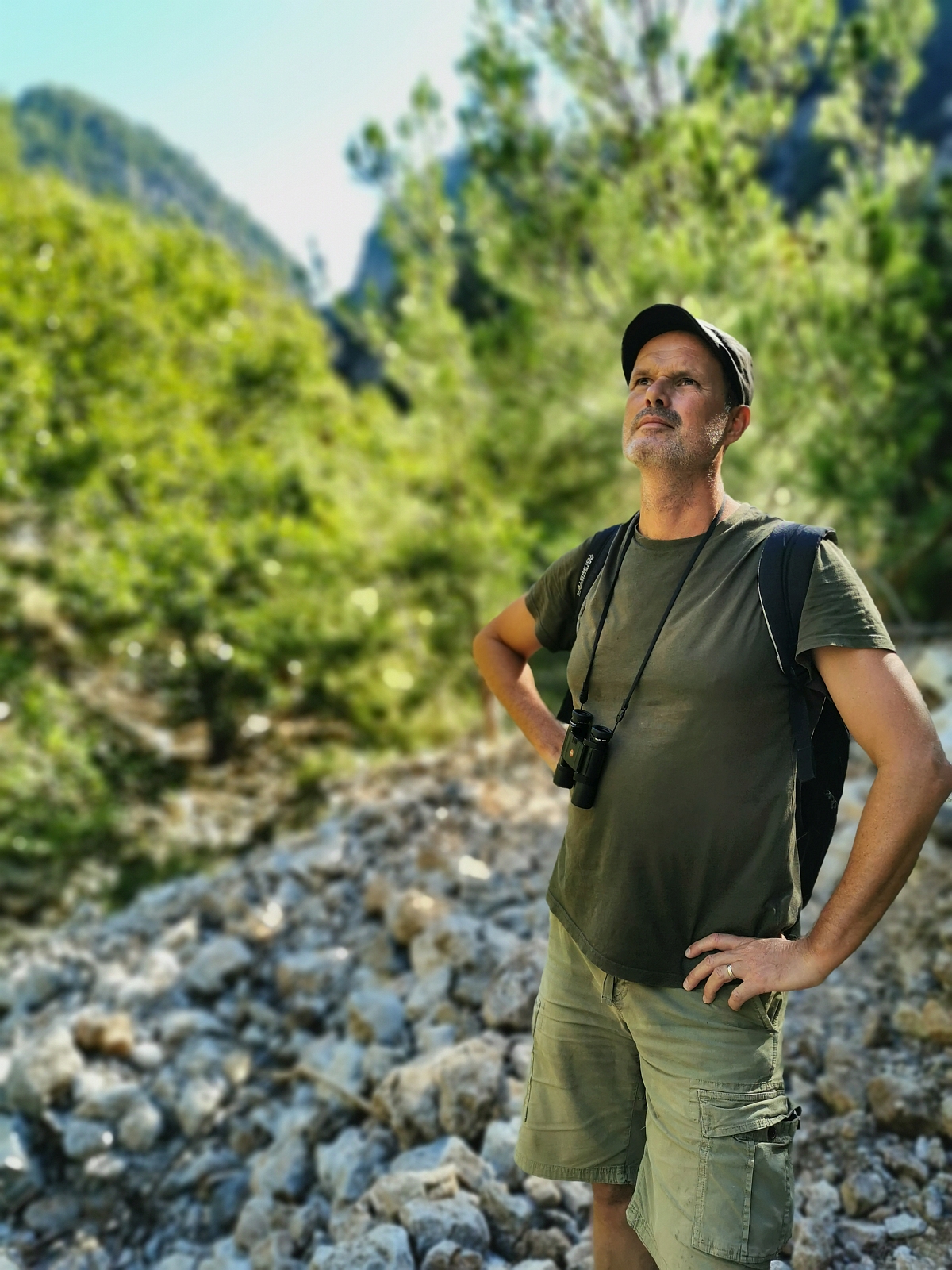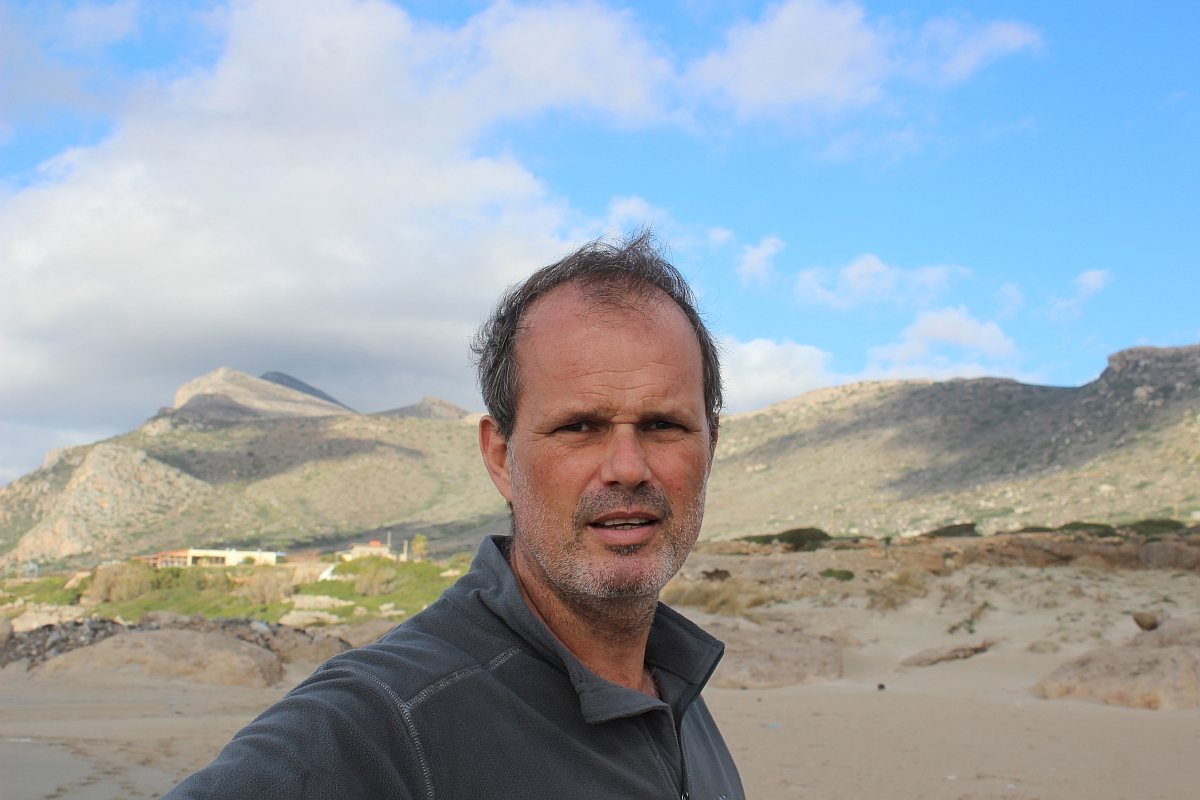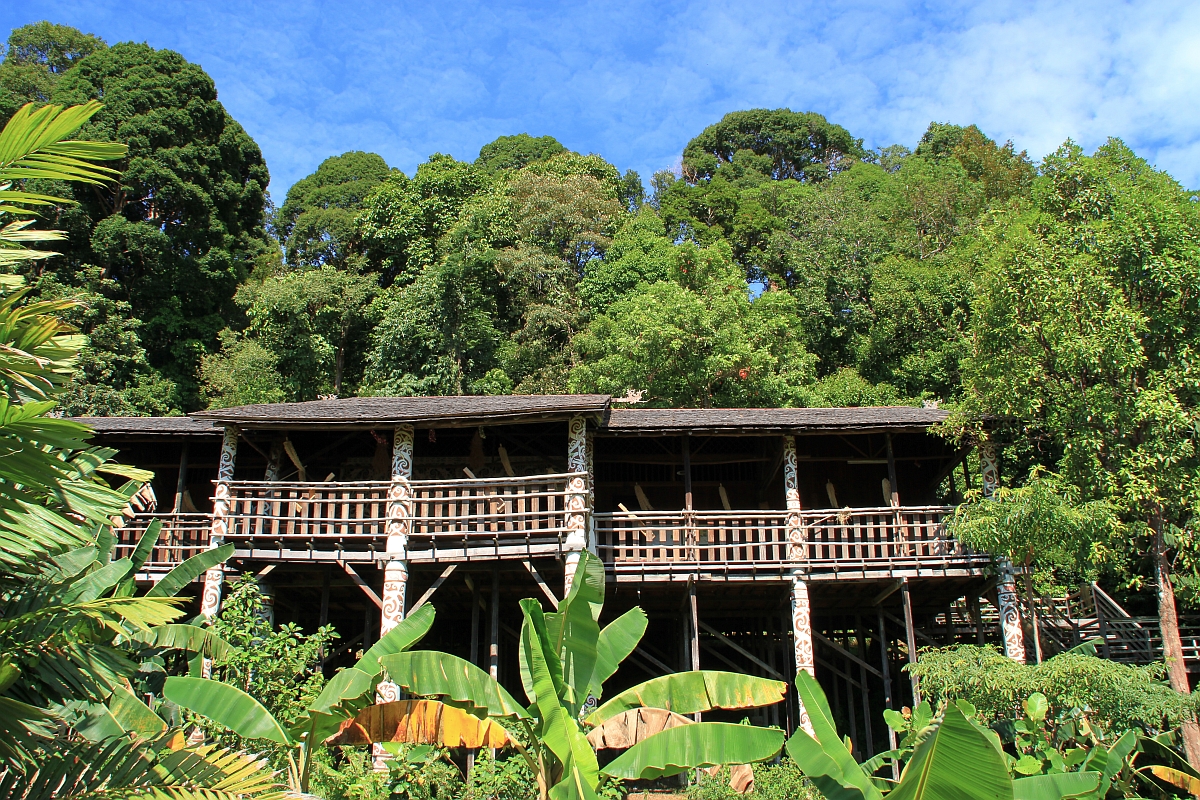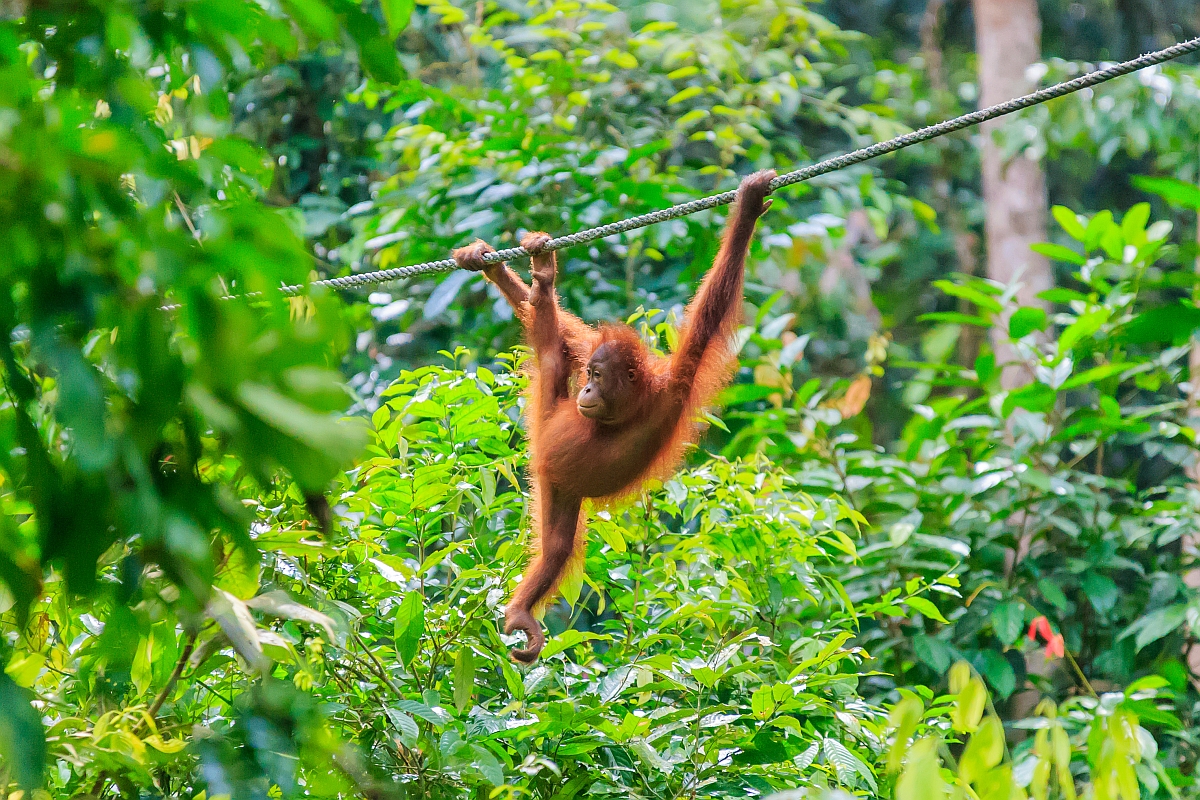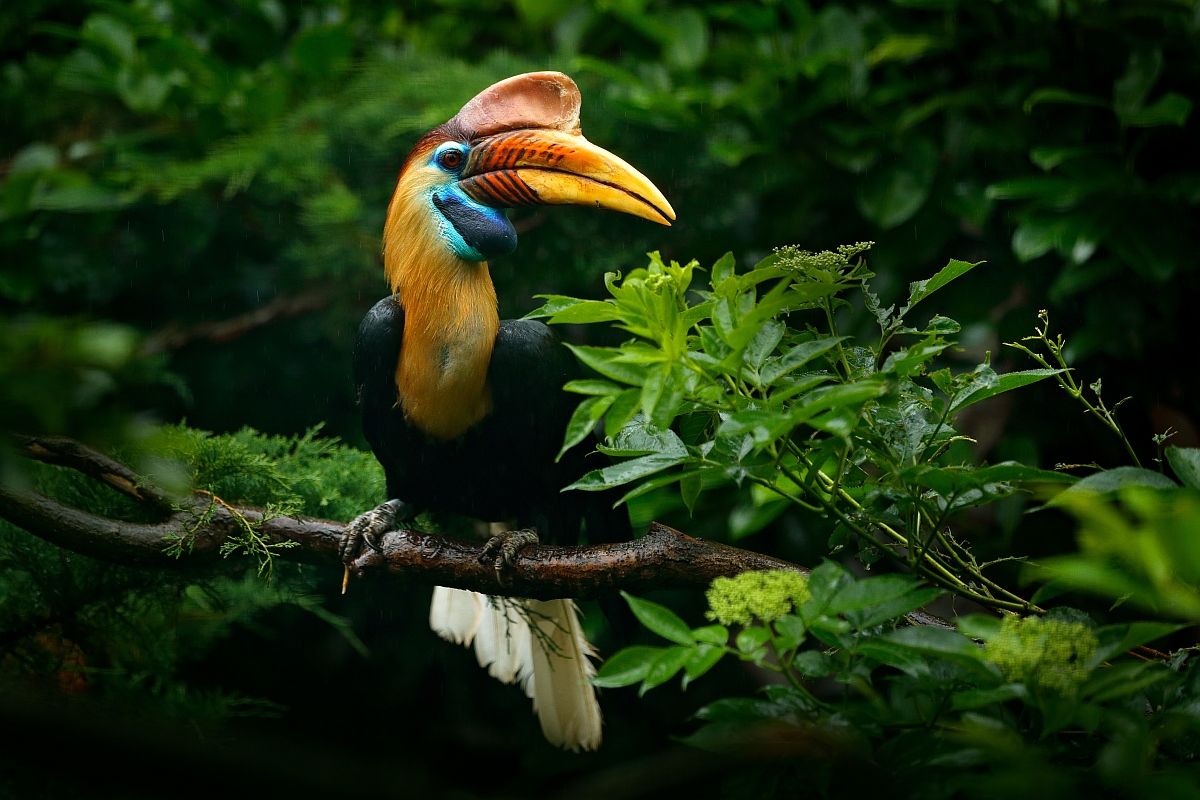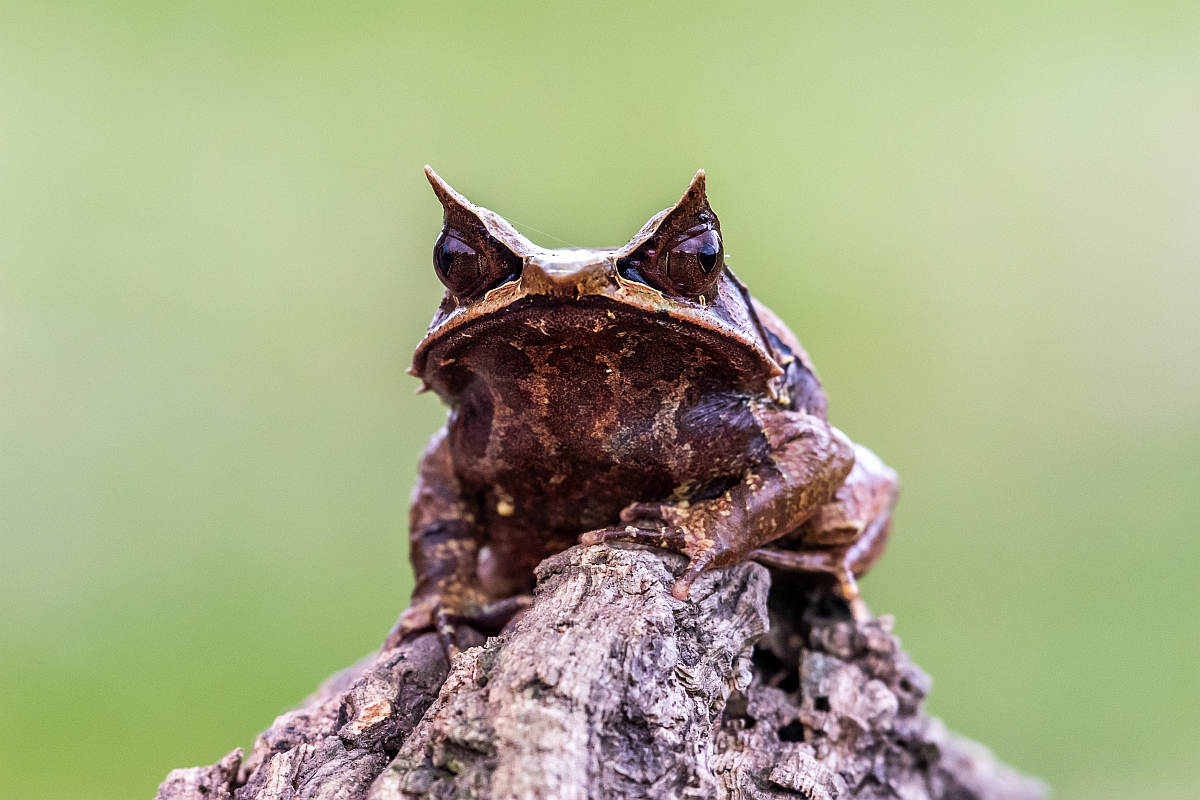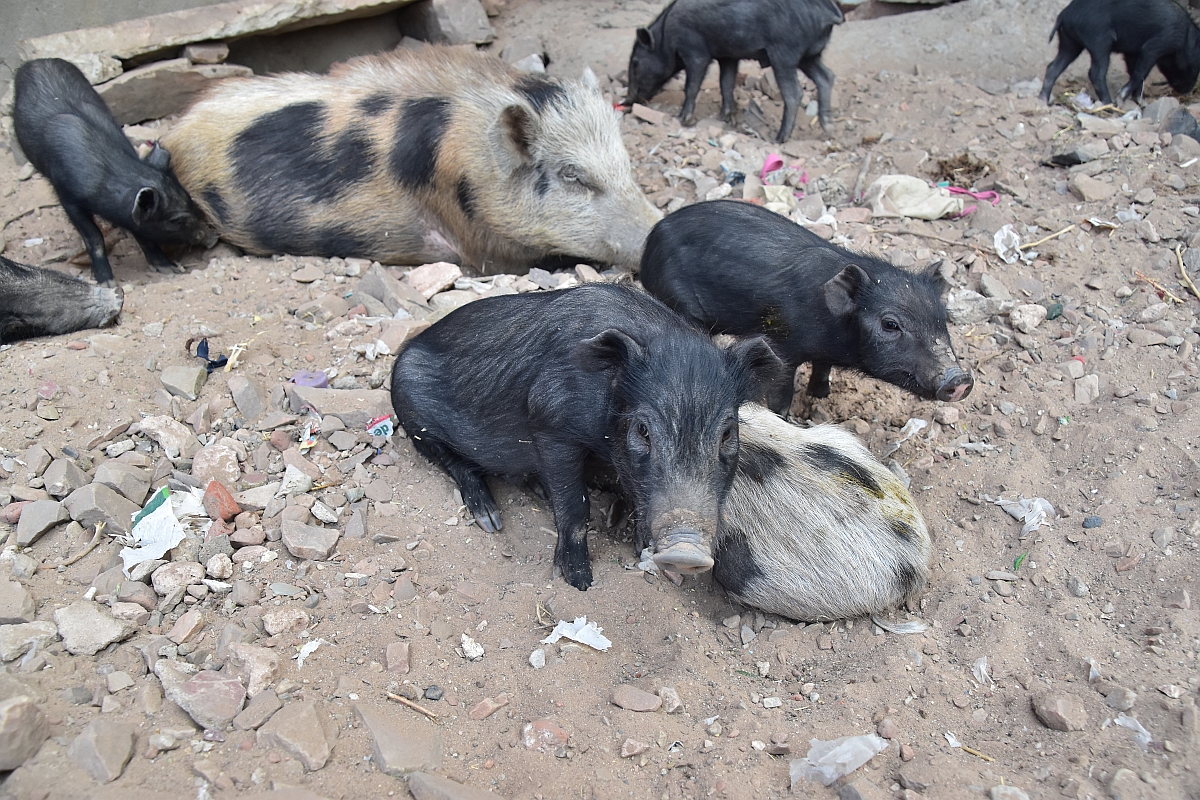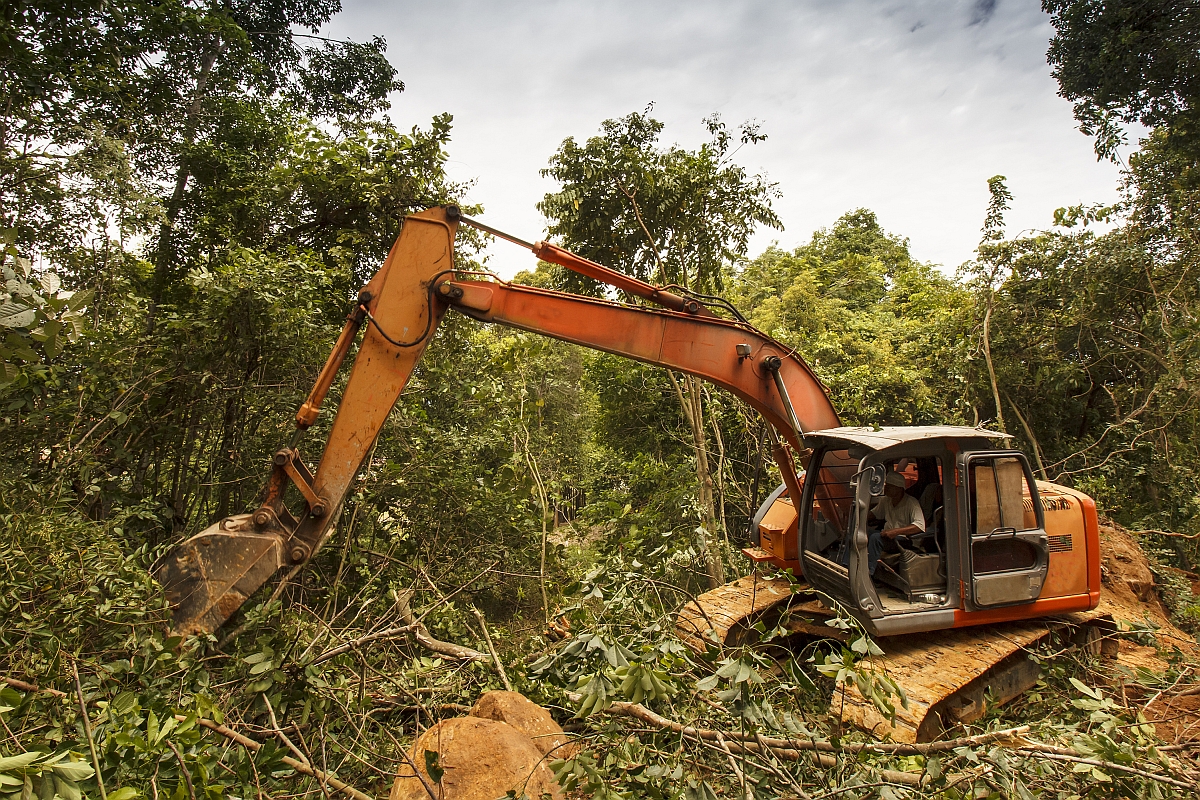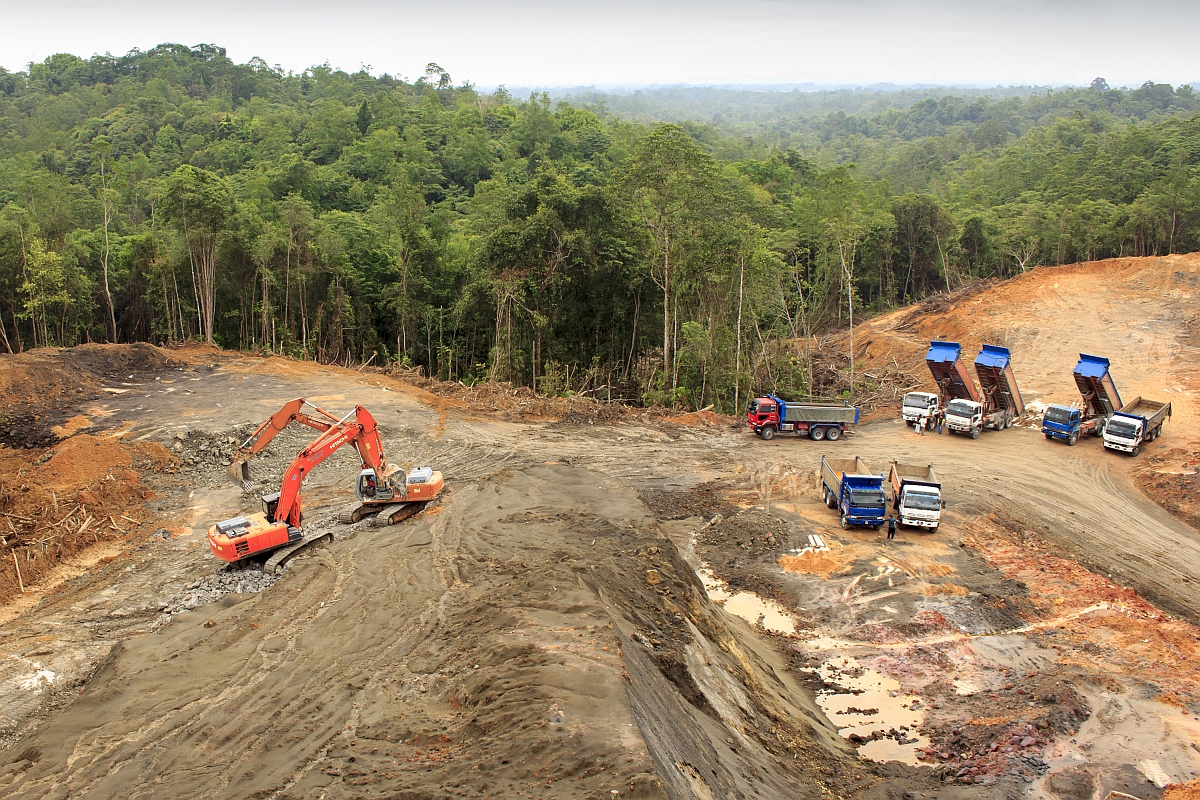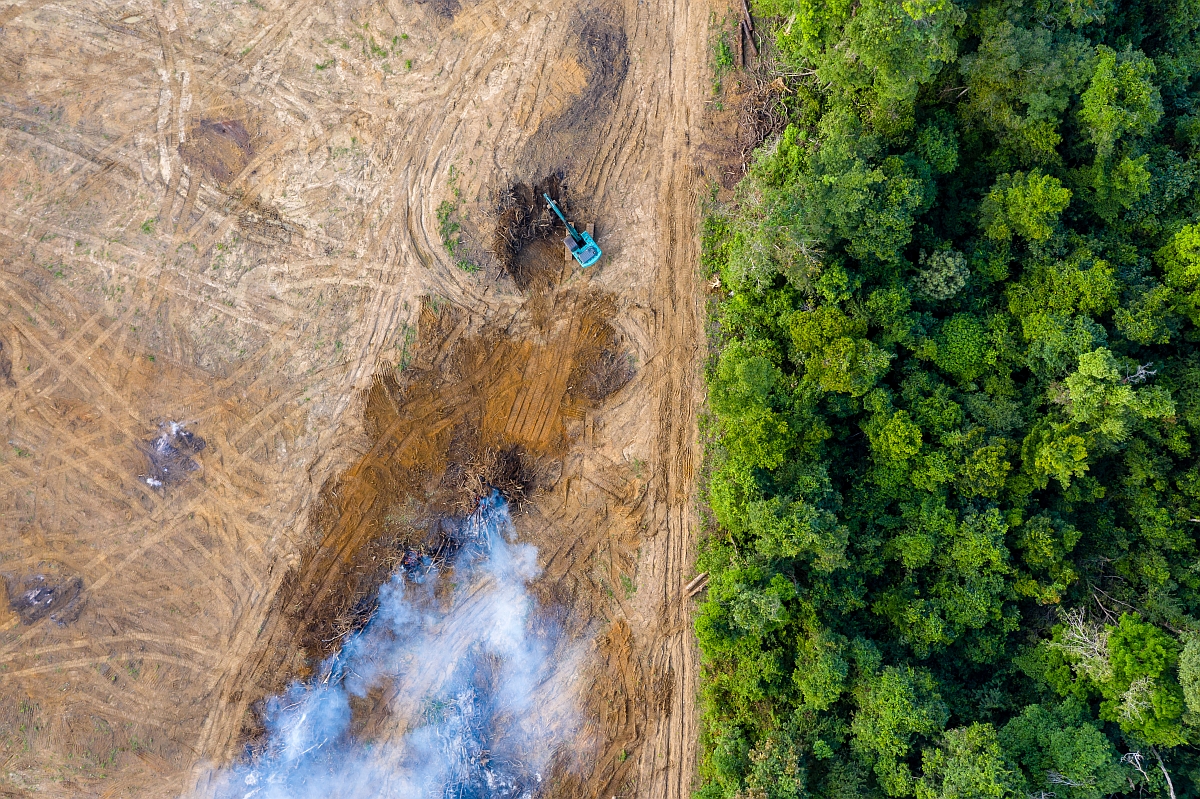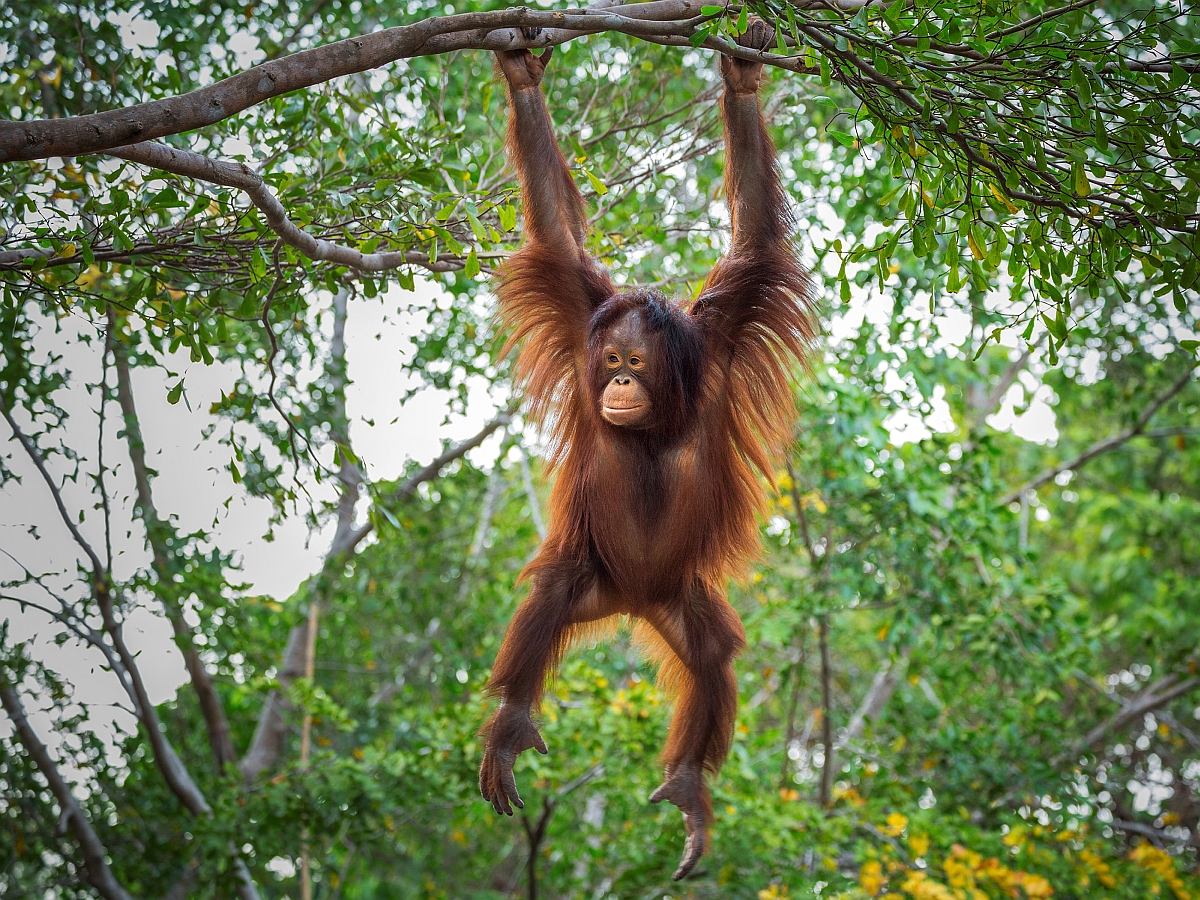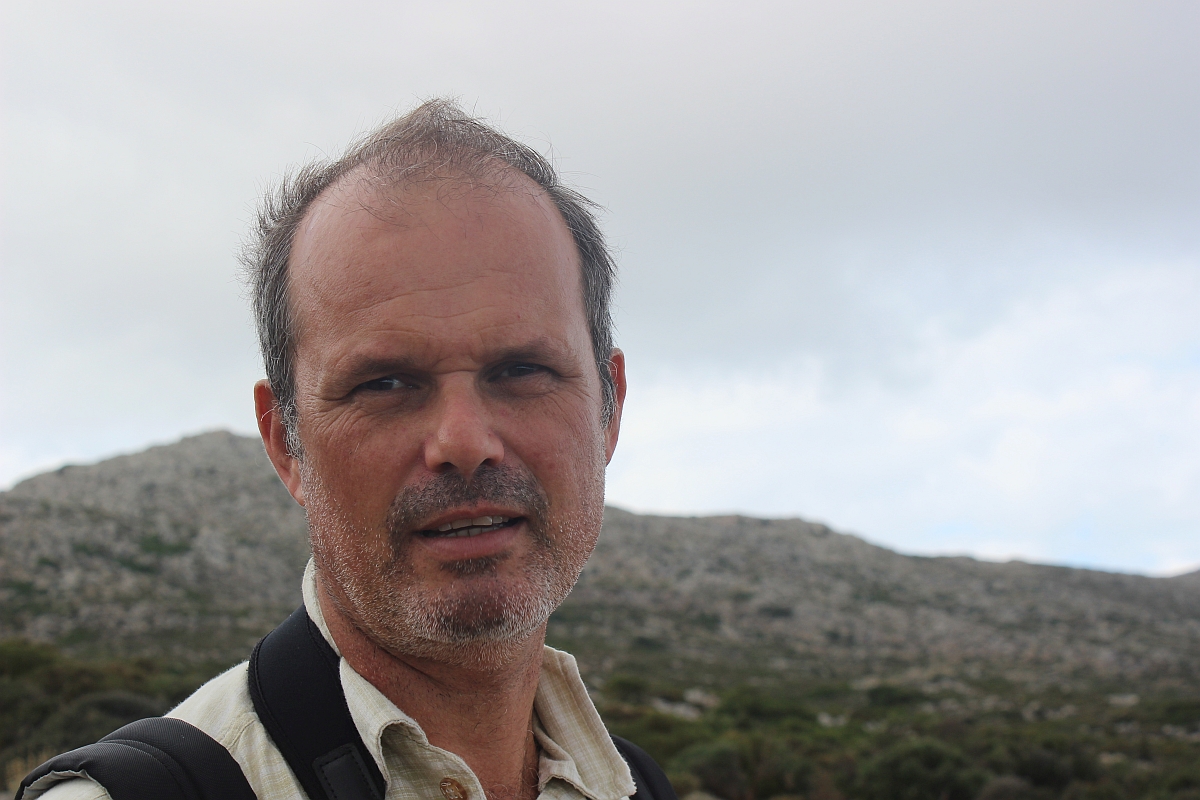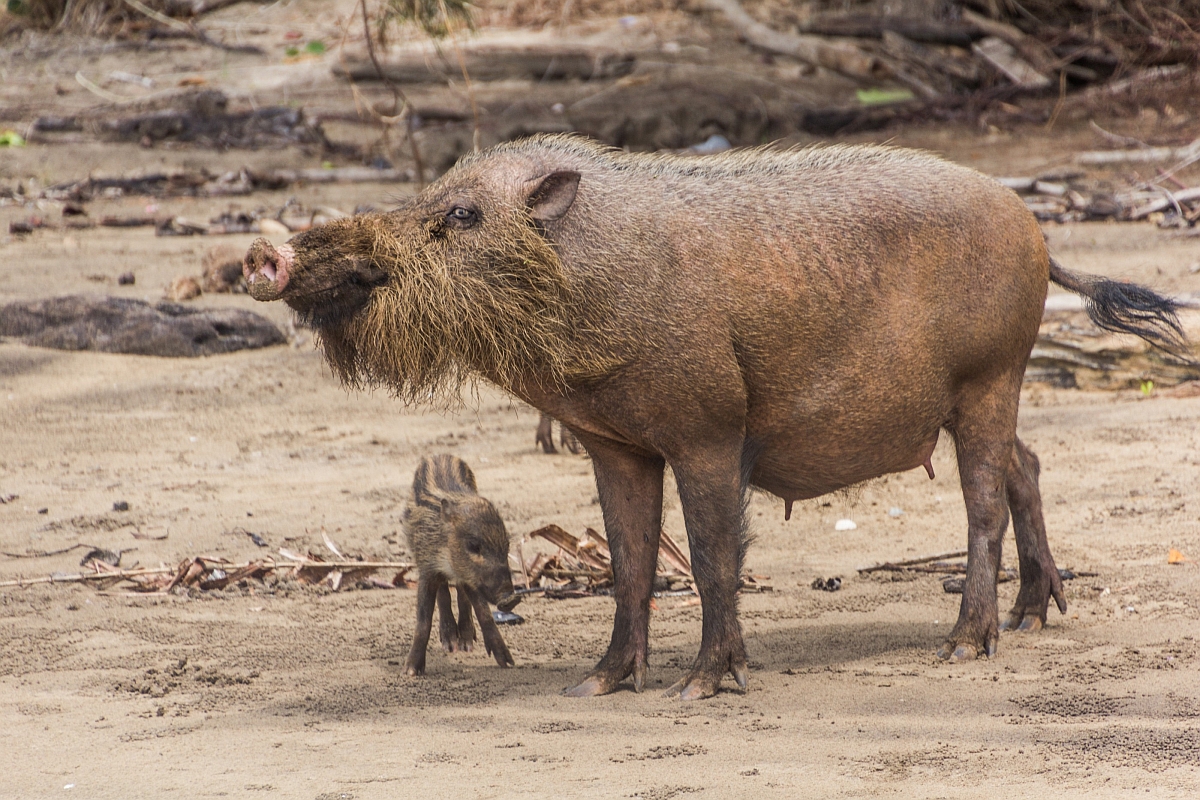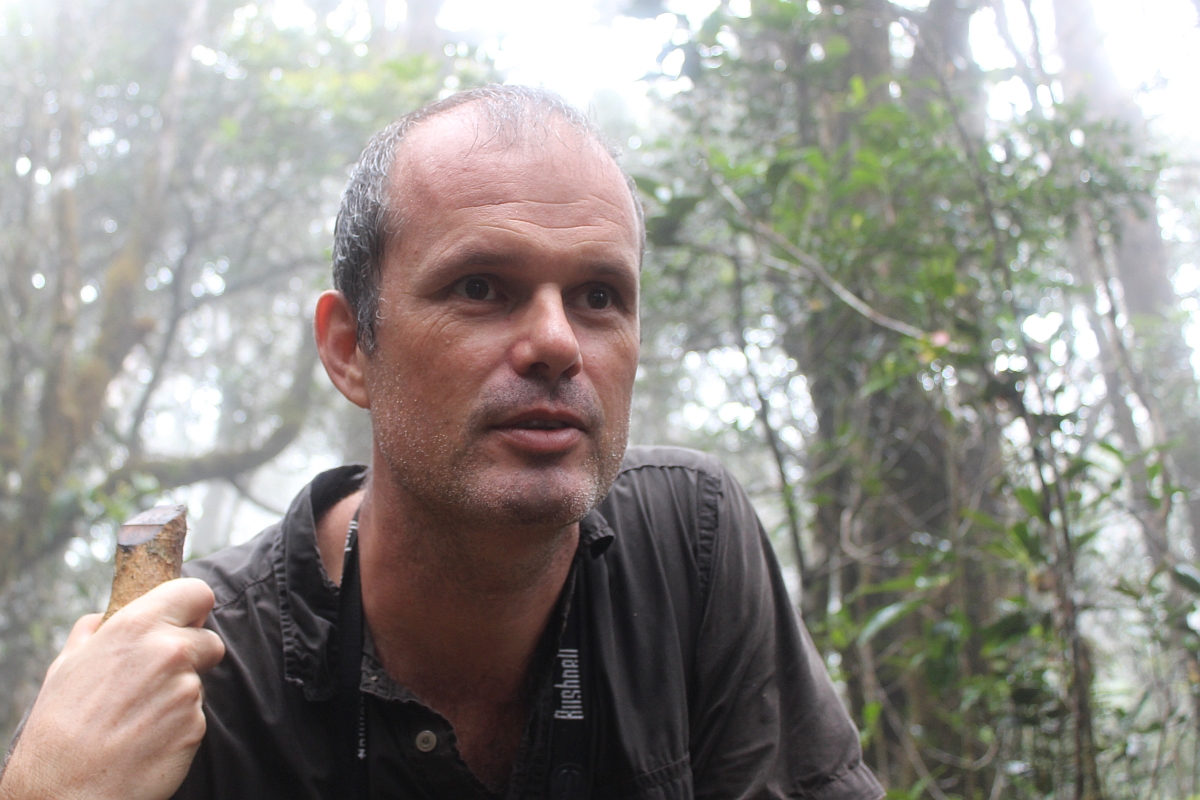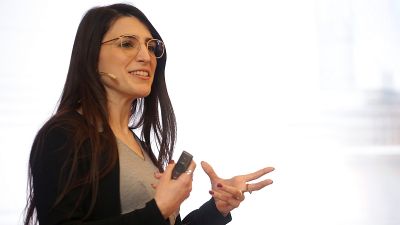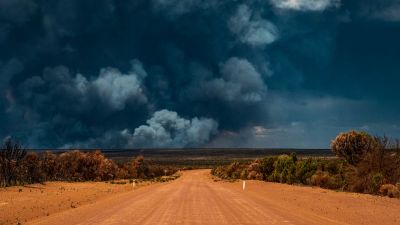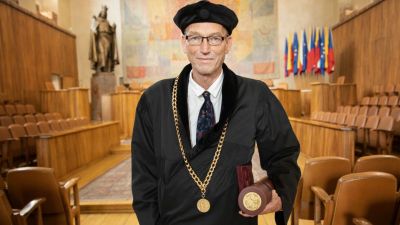Dr. Erik Meijaard is an ecologist and conservationist with close ties to the University of Kent, who has lived and worked in Borneo since the early 1990s. He is the co-founder of Borneo Futures, focusing on better tropical forest management and conservation practices, based on innovative and real-world research. Meijaard was a visiting professor at Charles University’s Faculty of Science last semester where he taught Ph. D. students. He discussed his career with Forum as well as conservation issues in Indonesia including saving the orang-utan and the impact of deforestation on one the most biodiverse areas in the world.
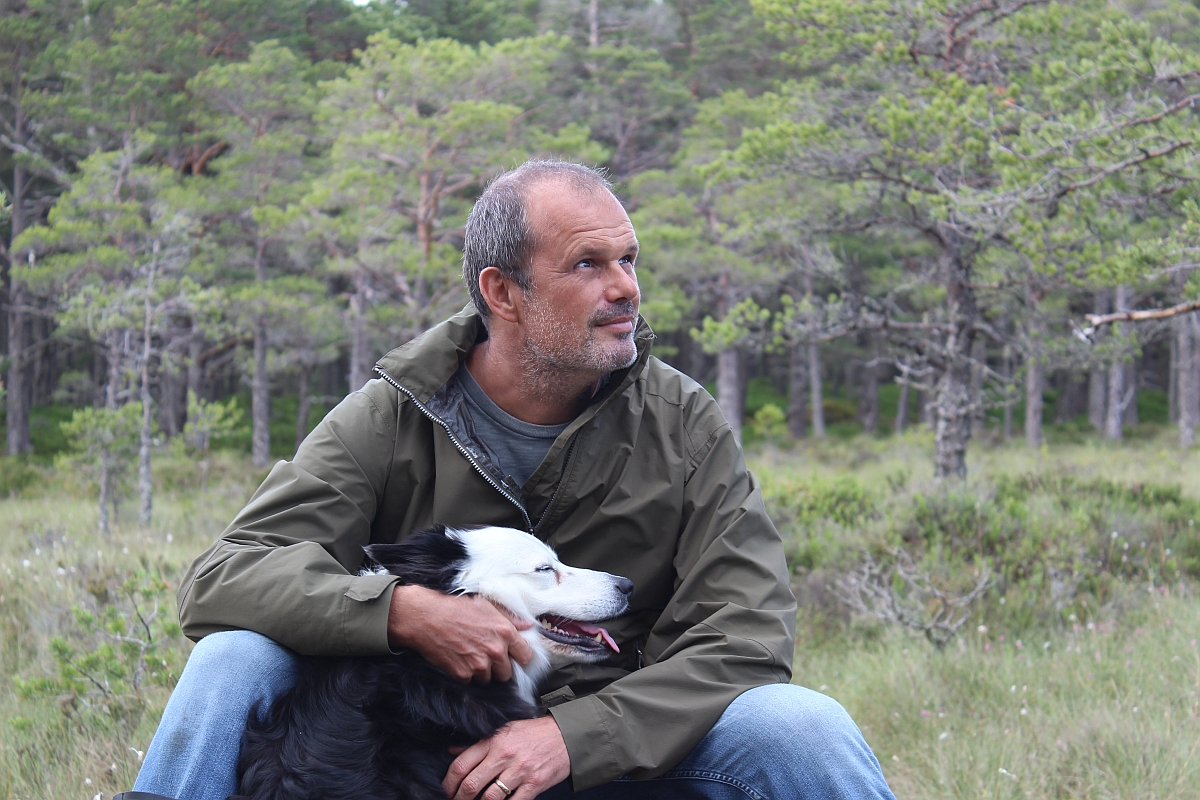
Borneo-based conservationist and ecologist Erik Meijaard with a friend. Meijaard taught a brand new course at CU on conservation management..
You have been working in conservation for quite a while – where did things start for you?
I started my career in conservation in Indonesia in the 1990s and after my MSc work, my first job was to develop the first distribution map of orang-utans. I spent three years traveling across Borneo, mostly by boat on the bigger rivers and consequently I saw Borneo when it was still largely forest-covered. Of course, especially the lowlands have lost a lot of that forest, so I saw the changes as they happened over the last 30 years. At the same time, I like to emphasise that for species like the ones I work on, like orang-utans, we sometimes overemphasise what has happened more recently. My assumption is, that the moment that humans first walked into their habitat 80,000 years ago, was the moment they started to have an impact.
I still maintain that – over longer evolutionary timeframes – an unsustainable killing rate of the apes has probably had a much larger impact than the loss of their habitat, even though now we are focusing on that. The killing rate has always been key: the orang-utan disappeared from 97 percent of its total range, all the way to Yunnan, China, and Thailand, and because we are so concerned with what has been happening the last few decades, the impulse is to think that the only solution lies with stopping deforestation. Orang-utans are remarkably ecologically versatile – they are just extremely slow at breeding. So addressing that killing rate is something we need to focus on and we don’t do that enough. So yes, I have seen the changes and it is deeply saddening but at the same time, we need to look across longer timeframes as well.
What drives their killing?
We conducted Borneo-wide surveys and questionnaires in 2007 and 2008 to get an answer to that. I had about 20 different NGOs visiting some 700 villages asking about that and trying to quantify the annual killing rate. About half of the killing is opportunistic in nature, for meat. I’ve never really come across hunters who go out to kill an orang-utan but the killing rates are such that hunters in one village kill maybe one every two or three years so it hardly registers compared to number of deer or pigs they get.
But orang-utans are just so slow in their reproduction rate that they can’t cope with a one percent per year adult mortality so if you take one adult out of a population of one hundred, that population will go extinct. That’s the great sensitivity or weak spot. So probably half of the killings are meat-related and half are in conflict situations, where they are being pushed out of their habitat by tropical deforestation and fragmentation and end up in fields and gardens where people are afraid or angry because orang-utans steal their fruit and so they get killed or harmed in the process.
You are Dutch by nationality – how did you start working in Indonesia?
I was studying biology at university and an opportunity came up to do MSc research in Indonesia, tied to the historic links between the countries but I didn’t know much about the country at first. I enjoyed it there and it is where I have always worked. Essentially, I never left. I try to focus on other parts of the world, such as Gabon just now. Prior to that, I had never really been to Africa. I was in South America only in Brazil, once, but generally I focus on southeast Asia: Malaysia, Borneo, Indonesia. It’s kind of nice because it allows you to ‘dig’ really deep and I’ll come back to that: I think a lot of conservation scientists tend to step back and look at things broadly and superficially. I’ve gone really deep and across many disciplines to get a very good holistic understanding of what is going on and what the potential solutions are.
What are your ties to Borneo and Indonesia, having lived there as long as you have?
I definitely have a love/hate relationship. A hate relationship because of the troubles it gives me in terms of trying to address conservation issues but also a love relationship: a feel of the land, the people, the friendliness, I know the language very well. I feel very comfortable in any part of Indonesia at any time of day. It’s a beautiful country of course, in its diversity and strung out, as it is, across the equator. There is huge biodiversity – I was just looking at some bird species numbers and Borneo has 720 bird species! That’s about as many as all of Europe, discounting real rarities that occasionally pop up. But Europe is 50 times larger, just to give an idea of the diversity you find there. As an ecologist and enthusiast there is just so much to see.
But I am not really a typical ecologist. I started as one but became fascinated by the overall system of how geology and human evolution and human dispersal and ecology and history mix to create a hugely complex system that is now changing. It’s an endlessly fascinating part of the world to work and I am sure I will never stop learning or fully understand it. But that’s the fun of it: [taking a bite of something larger than your can chew].
Looking across the many different papers you have worked on, they often seem like very different challenges.
We tend to think about conservation as being about species but in fact it has only a little to do with that. There’s a little bit of ecology in there but conservation is mostly about people, economics, psychology and politics, social sciences… I work with many anthropologists… and that is ultimately where many of the solutions lie. If we want to conserve biodiversity in the world, we need to significantly change peoples’ mind set. Even the term nature conservation is a bit daft if you think about it. Nature will be there no matter what we do, we don’t need to conserve nature as such. If we want to conserve certain species we can if we choose to. But ultimately it is also about our own survival and finding solutions in how we engage with the surroundings around us. I was reading Novacene by James Lovelock and the question is, with current developments, how long will it be before self-reproducing AI surpasses us and no longer needs us. There are all sorts of unknowns.
You mentioned the political aspects – how important are they in the work done by Borneo Futures?
I started Borneo Futures with a good friend of mine, a French guy who had been working in Malaysia and the idea is that if we just do research or publish a scientific paper alone, that’s not going to do anything. The least you should do is try and communicate what you are trying to do in your scientific field and translate it into language that the broader public understands. So we have run this programme for 12 years now where we use science to inform public opinion about practices in conservation. I used to write a lot for newspapers in Indonesia. Recognition is I think where I can have the most powerful impact. Writing sharp articles and seeing things translated into policy. I have had a few moments when that was the case.
The reason we are successful, is because we have the science behind it: we are not just someone expressing an opinion, there are years and years of solid peer-reviewed research behind us and that gives us the ability to say or be vocal on issues. That is the broad idea. To do innovative research and science and to translate that into communication tools with the ultimate objective of changing policymaking and public opinion about things like the use of resources and so on.
Have things gotten easier? Are governments, either national or municipal, more open to different solutions?
There is definitely more awareness and it is obviously now much more on the international political agenda. Whether the practices have really changed is a different thing but I work a lot in extractive industries like oil palm, timber concessions and mining concessions, and the stuff I am doing now would not have been on the agenda 20 years ago – at all. No one would have cared enough or there would have been a lack of political and public pressure to implement more ecological practises. Things have changed. But at the same time problems have also increased massively over the same time frame. I mean, we can talk about Borneo but the problems are all over: it saddens me when I go back to the Netherlands and I go for a walk in these completely agricultural fields and in spring there is just nothing there.
There is nothing singing in the sky and people like my mum say ‘Let’s go for a walk in nature,’ and it’s like what nature? It might as well be concrete: there is nothing there. That is just bad management: economics rating higher than biodiversity and that is the outcome. The solutions are being found and there is more discussion today, but the problems themselves have also grown much larger. Things have changed but maybe not for the better.
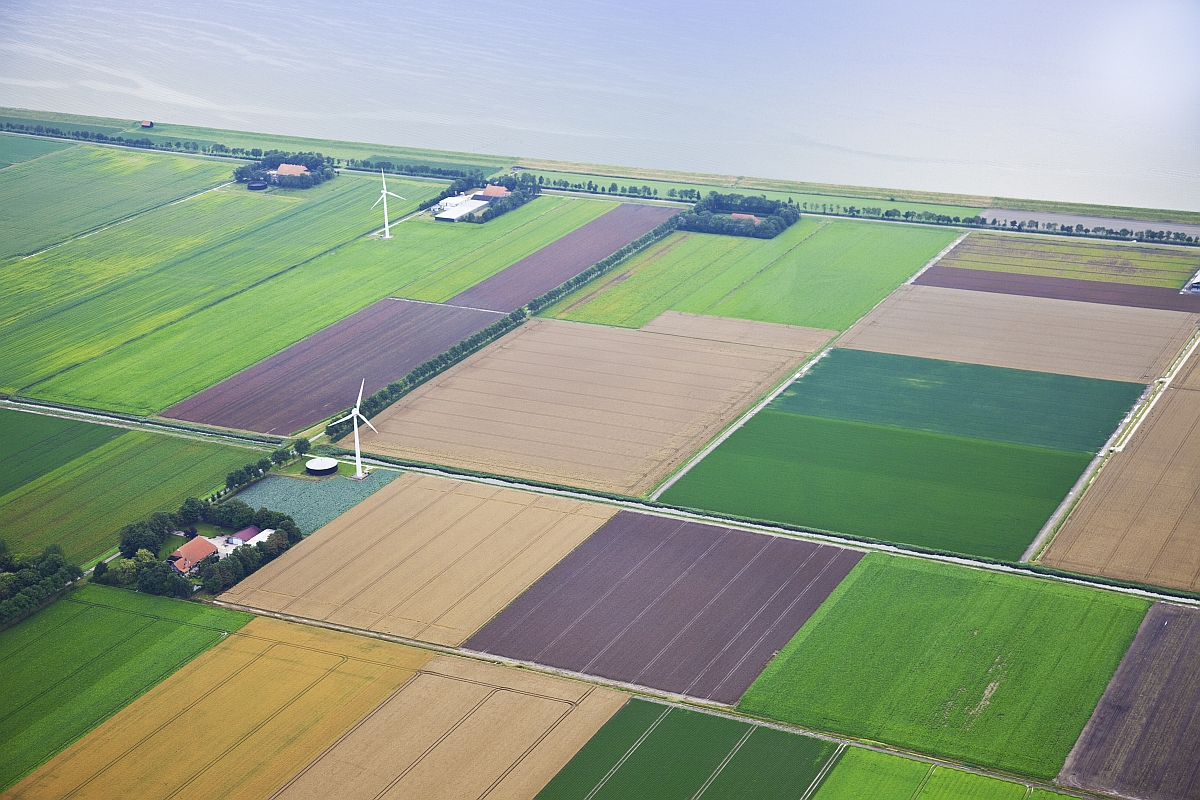 Want to go for a walk in nature? Okay, but where? A scene from the Netherlands.
Want to go for a walk in nature? Okay, but where? A scene from the Netherlands.
Do top-down decisions work?
If you take something like palm oil that is a good example where the context is just so polarised and oversimplified. By all means, if you don’t like palm oil, don’t use it. But just realise you will be using something else, because the fats are needed there, probably not as much for us as for malnourished people in the world, but there are no simple solutions out there and I think that is where people get things wrong. Even at the political level, Europe deciding to say no to palm oil means you will say yes to something else – such as soy bean oil from Brazil. Or if you say no to that as well, you will see increased rapeseed production in Czechia, which comes with its own problems in biodiversity conservation, so the “free lunch” just isn’t there, which is why we need to dig through this complexity and get people to understand.
There is a quote I often use by Henry Louis Mencken that for every complex problem there is an answer that is “clear, simple, and wrong!”. I very strongly believe in that. It spurs people to say ‘Let’s just do something!’ but often it addresses only a tiny part of the problem or at times even makes things worse. Many probably undermine the system rather than help. People get frustrated and they are emotional about issues like conservation but a lot of the approaches have side-effects as well. You can’t just go and shoot the poacher.
Does that mean, when it comes to conservation, that steps implemented need to be tailored specifically to local conditions?
I don’t believe in silver bullet solutions: everything needs its own analysis and approach. And coming back to simple answers, sometimes you do get it right. The situation can be so fragile that a decision can turn things around. A few years back, in western Borneo we had a battle over a forest area in Indonesia west Borneo that was a large area with around 1,500 orang-utans. The areas was slated for plantation forestry that would probably have killed most of them. We kept pushing and pushing and I wrote a piece at some stage questioning why Indonesia was letting the Chinese kill its orang-utans, because we knew there were Chinese investors behind it. And the next day, the ministry withdrew the license, which has since been overtaken by a conservation organisation and for the time being the large area is safe.
So sometimes the simple answers do work and in that respect I do have hope for conservation. A species like the orang-utan should not be difficult to save: you just need a little bit of guts and a bit of determination by governments. If killing is the issue, if the president of Indonesia would go on TV and say ‘Let’s not do this anymore, nobody needs to kill orang-utans,’ that could solve the problem. Done. You can have a systemic shift – somewhat similar to a supersaturated solution where one small change – an extra crystal – leads to fundamental change – I think that’s also possible. Change is possible and I think we can generate change, if we find the right trigger points.
I am Czech-Canadian and one thing we are proud of (especially as kids) is having animals on our change, from the beaver on the nickel to the moose on the quarter and the loon on the dollar. They are national symbols. Do Indonesians have anything similar? Do they take pride in their orang-utans, for example, like the Chinese do with pandas?
I think that they used to have the orang-utan on the 500 rupiah note but it has devalued so much it’s not worth anything anymore. They used to have it, I don’t think they do anymore. But I don’t think Indonesia is hugely proud of its orang-utans, I don’t get that impression but that could be done through smart politics, like China has done with the panda. It just needs political will. On the other hand, the situation is stabilising: we have a recent paper on deforestation rates and oil palm expansion in Indonesia showing that they are really down from 10 years ago.
That doesn’t mean they cannot go up again but I have always said about places like Borneo that we are not talking about 100 percent deforestation, some of the mountains are very difficult to get to, the question is when will deforestation stabilise, how much will we have lost by then and what can we do to accelerate the transition to forest gain. I hope that now we are in a situation where we all agree things are permanent and this is going to be forest, this is going to be agriculture, and this is how we can manage it. The emphasis turns to management rather than just avoiding loss.
Is oil palm the main driver of deforestation?
In Sumatra and Borneo it is a major factor, fire plays a major role as well, accidental or as a tool to claim land for future conversion to oil palm, they can be indirectly linked. In general, agriculture is the main driver, in addition to oil palm, also other crops. It looks different on Papua, we are looking at coconut as a significant driver of deforestation that people haven’t really thought about in east Indonesia.
To turn back to the orang-utans one last time, you mentioned at the start that your first work was mapping their population across Borneo. What was that work – and that experience – like? Were you able to observe them directly?
You don’t count orang-utans because you normally don’t see them, you count their nests. But I did it for several months, covering a tiny part of Borneo when I realised it wasn’t going to work, so I shifted more to interview-based techniques, where I spoke to locals to get a better picture. And that’s when I began thinking about how they were being killed and the reasons. So they’d tell me, Yes, we eat them, and so on. I am not an orang-utan ecologist, I have never studied them as such. That said, I did encounter a fair number of them and it’s always exciting and always fun. Especially if you are driving and you notice a big adult male sitting in his nest looking at you and effectively staring you down: This is my nest, get lost! Or fleeting glimpses through the canopy. It’s always exciting because it’s rare.
You see one or two… it is always lovely and ironically one of the best places to see them is the oil plantation where I have done work for 12 years and they have protected large forest areas around there where there are around 100 – 150 of them. Having said that, behaviourally they are not my favourite species, they just sit there or go to sleep. Not much happening. By contrast, I am a big fan of pigs.
I wanted to ask about that: do you mean the bearded pigs? Are they common?
They are a lot less common than they used to be, they are extinct in certain parts of the range, and swine fever is going through the pig population now and we don’t know the outcome yet. Some places have 100 percent mortality so the impact will be big. But it’s a really fascinating species. In my experience, you can sit in longhouses talking about wildlife… if you talk pig you will talk for three days and there will be drink and laughter and dancing. And there will still be new stories like ‘My great-great grandfather was out and came across a huge pig outside and it was a huge fight with blood and tears.' Orang-utans? The locals sort of go quiet. Pigs are cultural keystone species and they are important in ways that orang-utans are not. Orang-utans are important to us, they are not important there.
The wild pigs are part of day-to-day life, part of sustenance and the economic cycle as well as local legend.
For the Christians, not the Muslims of course. For them, pigs are the key source of protein and because of the bearded pigs there is just a huge culture around them. They are one of the few tropical forest mammals that migrate over these long distances. You have these eruptions of huge migration where thousands are killed crossing rivers and such and the culture is kind of shaped around these opportunities of fattening or stocking up on pork. It is very important for them culturally in a way that orang-utans are not.
Sometimes as conservationists we have to be careful. You have these images of baby orang-utan being fed with milk bottles and taken care of and it angers some locals. You have a mum who says 'My daughter is sick and no one comes and feeds her bananas'. We have to be careful. There was an article about how only orang-utans got life jackets when they were being transported in cages by boat, and the life jackets were packed around the cages in case the boat capsized. But the move was being aided by people, many of whom couldn’t swim who didn’t have life jackets themselves. Sometimes we can be really stupid: you need to think about the impact.
You just completed a semester teaching at Charles University, where you also gave public lectures in person and online – how did that come together?
I saw an ad somewhere that they were looking for someone to teach a course on conservation so I put a proposal together, featuring 20 lectures on ecology, conservation and management, and submitted it and was offered the job. It was a new course designed by me and it was quite labour intensive: two 90-minute lectures a week to be designed as we went. Normally I am very busy and it’s true that I am now a little behind. The course was very broad, going from global biodiversity and where it occurs to where conservation problems occur, we discussed island geography, but also got into things like sustainable development, and an overview of organisations involved, so a very broad overview.
I thought it would be good if I knew more than my own students so it kind of forced me to go back to my own science and read up so I actually caught up and picked up a lot of material I never initially saw. So it was very good to catch up on things and come up with some new insights as well. I really enjoyed putting the course together and teaching it and they were quite small classes that provided a lot of opportunities to debate and engage and get views and questions. There were five enrolled students but sometimes other Ph. D. students would join us and the class got a lot larger with people who were interested, even beyond Charles University. I had a lot of freedom and enjoyed it. It was easy on bureaucracy, the university helped with my health insurance, my salary was paid, and everything was arranged very well [That is the domain of CU's Staff Welcome Centre - ed. note]. The head of the Department of Ecology, Dr. Lukáš Kratochvíl, is such a solid scientist and there are very nice dynamics in the faculty. It was great to engage.

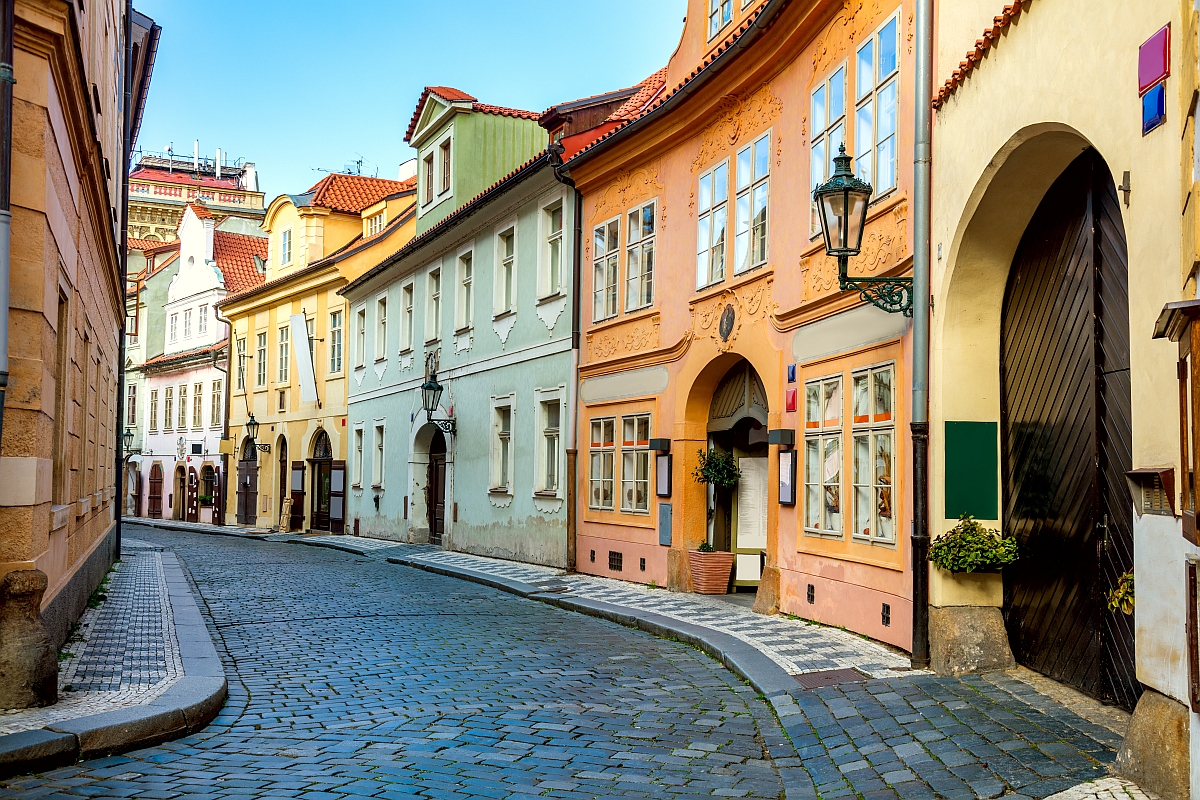
Typical images of Prague: the famous astronomical clock on the Old Town Square, colourful winding streets.
Had you been to Prague before?
I grew up in Germany so we had driven through but that was not the same. One of the great things about my stay was the city itself. It is the most beautiful city on Earth. You can’t help notice how beautiful everything is and every night I would walk five or six kilometres around the city and got a taste for different parts. One thing that was remarkable was how there were no signs of aggression. It was friendly and easy-going.
You mentioned in your online lecture that you were very used to working across disciplines: given the complexity of problems we face, is that the most efficient way to go today?
The thing is, I am not an academic. I mean, I was now, but normally I am just an independent researcher wanting to ask interesting questions and hoping to get interesting answers – in whichever way I choose. I can pick whomever I want to work with and what I want to do. I know really good anthropologists so it is easy for me to branch out into anthropology, so we can look at conservation jointly. Or it can be economics, the psychology of conservation, political science. Whatever we like and whatever we can get funding for – or not getting funding for if we just want to do the research unpaid. We apply for research funds but I also run the company Borneo Futures, so I pay everyone’s salaries and there are around 10 of us and anything left over at the end is allocated to research.
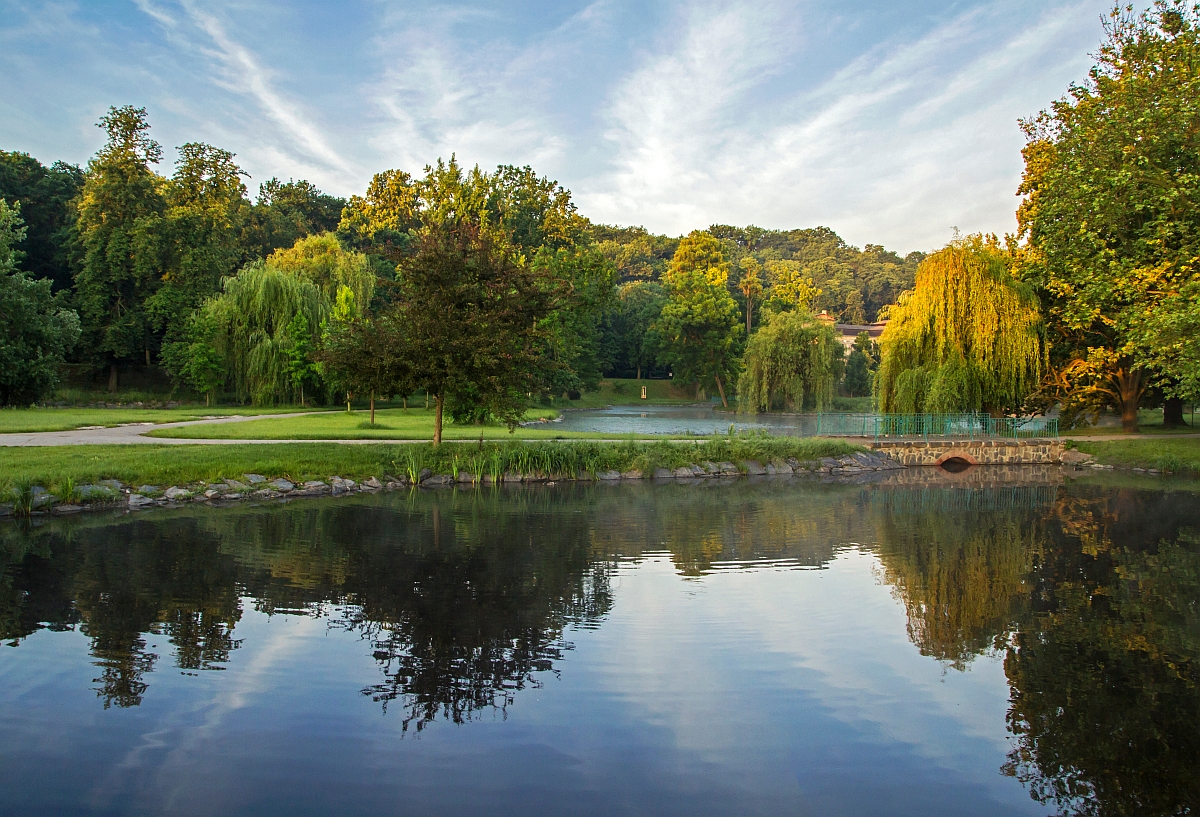
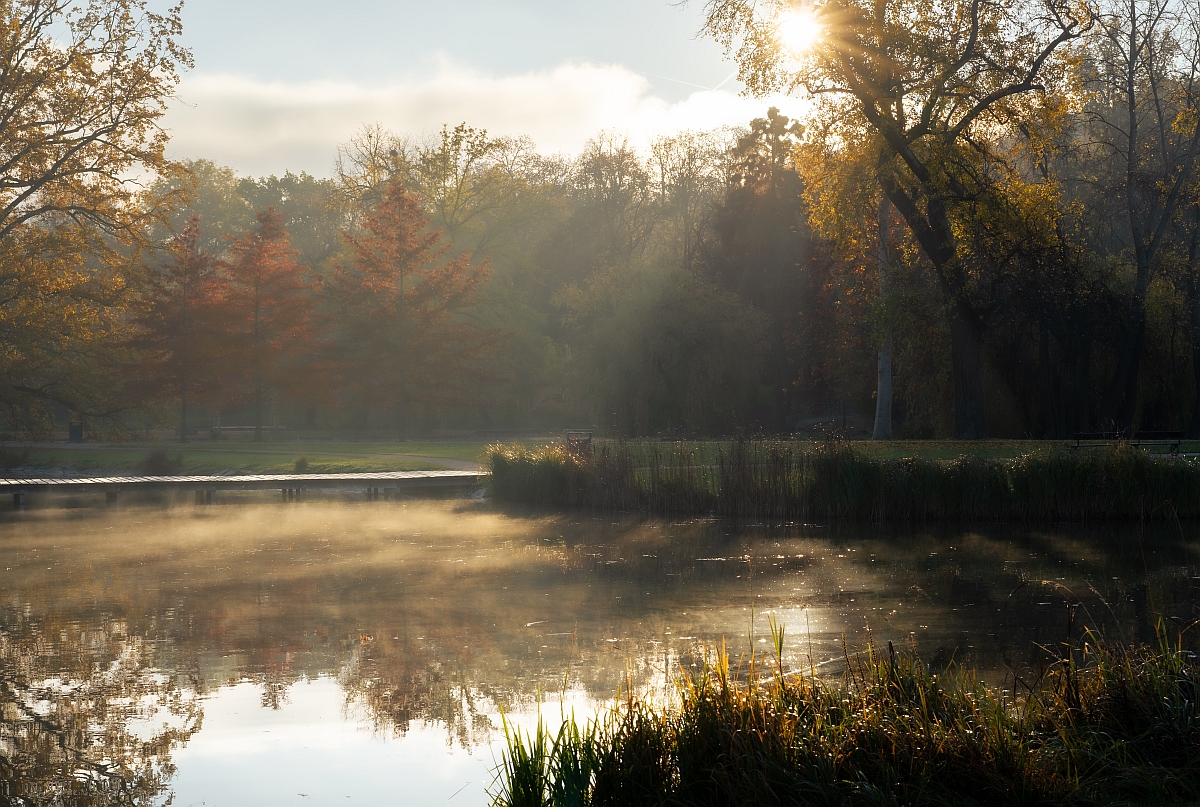
Not the tropics at all. Just a getaway in the middle of the city: Prague's Stromovka Park.
But generally speaking we have enough revenue to do the research that we want, mostly through research grants. Right now, we have a Microsoft research grant looking at using AI and neural networks to map coconut, which is a kind of merging of technologies and interest in a crop. I have another grant coming in for the global mapping of soybean, rapeseed and sunflower. We can have a good look at all of these. I am doing really interesting work on citizen science using low-tech solutions to get more people involved in monitoring the oil palm sector, which we want to now link to high tech and advanced database management. Things just come up. You have ideas and you look for funding. It’s just generally fast compared to doing research directly at university where it can take a long time for contracts to be signed. I am the director so I can sign them tomorrow and I often start work even before I have signed my own. It’s like, let’s go. There is momentum and that is important: if you are waiting, you lose the momentum. I like the idea of keeping things moving, implementing something, let’s worry about the details later. That’s a nice way of working.
The students enjoyed the class as well I heard. It’s valuable for them to learn from someone who has such hands-on experience.
The feedback was positive and they hadn’t seen anything like it. The final exam was a fictitious court case I put together pitting an NGO in support of human rights for the Tapanuli orang-utan – one of the three orang-utan species, fighting in court against a company funding a goldmine. Several faculty professors helped out as legal advisors and advocates, and we also had a jury. It was good fun. But also serious. The orang-utan supporters ‘lost’ the case and that was the reality. It was a fun way to get participants to think about the complexities. If I can, I would teach the course again. I would certainly do another stint, especially since the course has been developed now - I put in the hard work – and I could focus on other aspects as well.
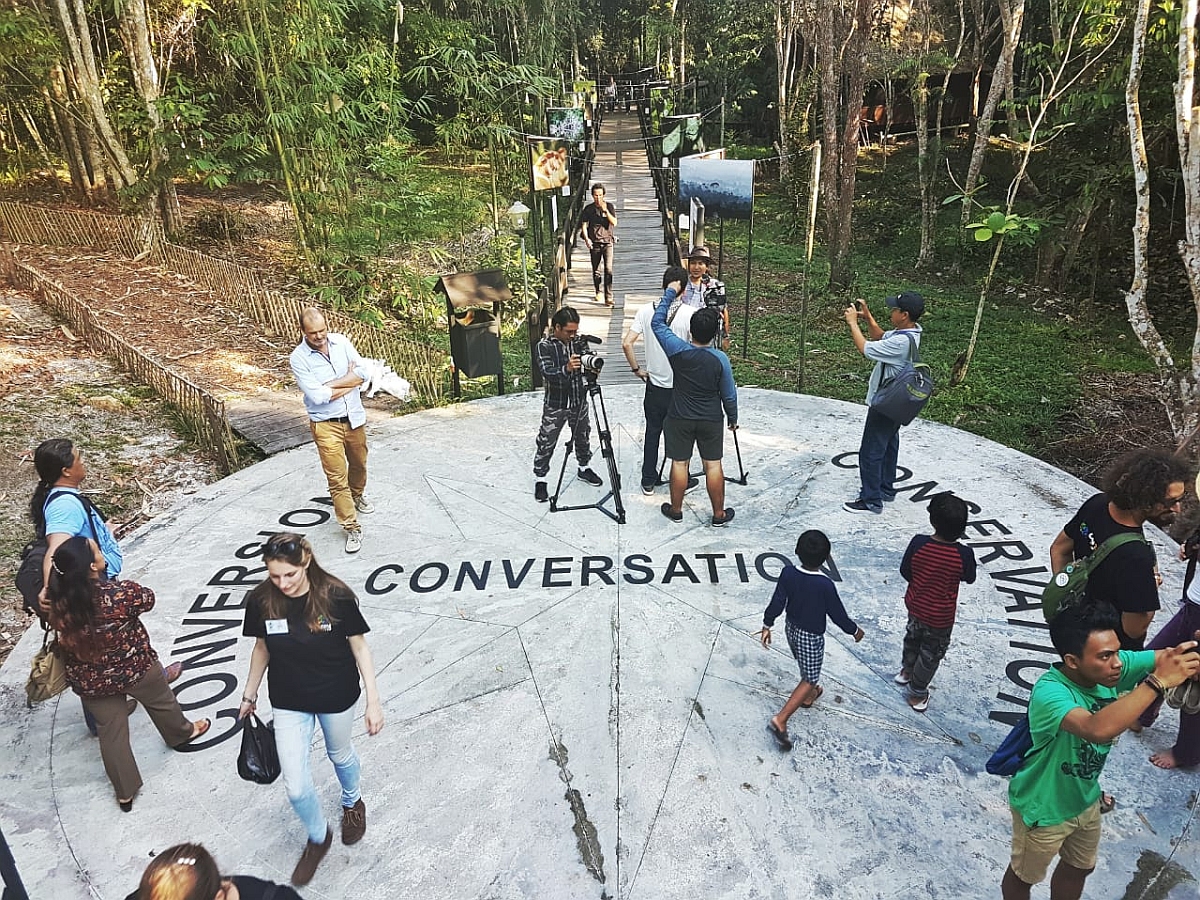
Conversation, conversion, conservation. All are important for Borneo Futures.
